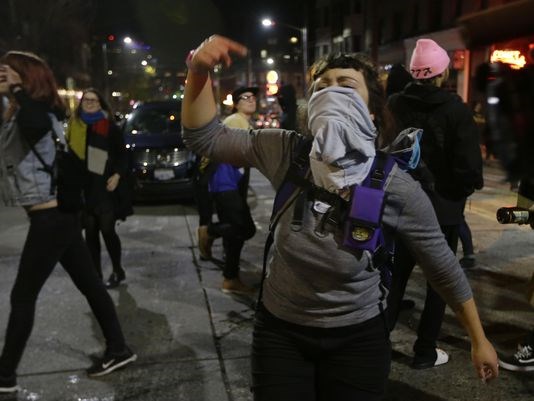A thoughtful reader responded to the improbable upset on Election Day by sending me these words of St. Gertrude (Gertrude of Helfta): “May the wounds of Christ make of no effect the handwriting that is against us.” They are sobering. When our giddiness subsides, and our schadenfreude—well earned and blameless this time—wears off, we would be wise to resume the prayer of this 13th century Benedictine mystic.

The handwriting is, indeed, against us. This election, delicious as it is to some of us, does not erase the baleful scrawl. We wait to see who Donald Trump appoints. We watch for signs of how he will govern among the lizards in the swamp that is still there. The Clintons—bottom feeders, both of them—are dead on the beach. But their appeal is not.

Their constituents are very much alive, so many of them young and with years ahead to continue the bleak Gramscian march that has bent and infantilized them. These are the spoiled naifs rioting, holding “cry ins” on campuses, marching the streets from Portland to New York. Their generation fears death by climate change, and worships the mirages of diversity, environmentalism, the roster of statist redemptions. They will grow up to become our journalists, judges, teachers—ideologues on faculty from middle school on—globalists, bureaucrats, and politicians. They are already our artists.

Nevertheless, this election’s offensive against the entrenched political class, the party elders on both sides, and the imperious gall of Those Who Know Best was exhilarating. It sent me to Perry Miller’s The Puritans. Some residue of the hardy Puritan character and frame of mind still informs the American people. Whether it has hold on the new administration is too soon to know. But let us remember that part of it that still serves.

Miller began his discussion of William Bradford, leader of the Plymouth Colony, by reminding that Bradford was not exactly a Puritan in the usual sense of the term. True-blue Puritans were members of the Church of England, a wealthy and powerful interest piloted by influential politicians and eminent clergyman. Bradford was askance of the norm:
Bradford was a Separatist, one of a small and earnest band of simple souls, all of humble station . . . in deadly combat with the authorities. The persons who made up the “Pilgrim” company were home-spun, hard-working farmers from Nottinghamshire and Lincolnshire. Their minister John Robinson was a university man, and Elder Brewster had spent a couple of years at Cambridge, but otherwise they were men instructed only in the Bible and in simplicity of spirit. . . .
Bradford’s history [History of Plymouth Plantation] is the story of simple folk, directly inspired by a religious ideal, working out the will of God by themselves amid incredible hardship. They suffered the privations of a severe, dangerous experiment and a deadly climate, all in full confidence that God’s eye was upon them. And on their fidelity. To use the debased lingo of today’s ruling class, they were the first bitter clingers, an ill-favored basket of deplorables.

Bradford describes the motivation of these men and women, moved to undertake the hazards of sailing a wild ocean to a remote, desolate place. Certainly, there was the desire of conscientious parents to remove their children from “danger to degenerate and be corrupted” in the Holland which offered temporary shelter. There were also immediate problems of employment in a nation unsympathetic to their brand of Protestantism. Lastly, peril loomed ahead in the inevitable end to the long truce in the religious war between Spain and Holland. But running through all else was:
. . . the great hope, and inward zeal they had of laying some good foundation, or (at least to make some way thereunto) for the propagating, and advancing of the gospel of the kingdom of Christ in those remote parts of the world; yea, though they should be but even stepping stones unto others for the performing of so great a work.”
One passage of the History that I had marked for myself in ball point years ago has application to the rest of us today:
All great and honorable actions are accompanied with great difficulties; and it must be both enterprised, and overcome with answerable courages. It was granted the dangers were great, but not desperate; the difficulties were many but not inevitable. For though there were many of them likely, they were not certaine; it might be sundrie of the things feared might never befale; others by providente care and the use of good means, might in a great measure be prevented; and all of them (through the help of God) by fortitude, and patience, might either be borne or overcome.
True it was that such attempts were not to be made and undertaken without good ground, and reason; not rashly, or lightly as many have done for curiositie, or hope of gaine, etc. But their condition was not ordinarie; their ends were good and honorable; their calling lawfull and urgente; and therefore they might expecte the blessing of God in their proceeding.
Today is Veterans Day, a fitting day to thank God for the men and women who have brought us this far. It is a day to beg God’s blessing on the American people. And may “a spetiall worke of God’s providence” make of no effect the handwriting that is against us.


